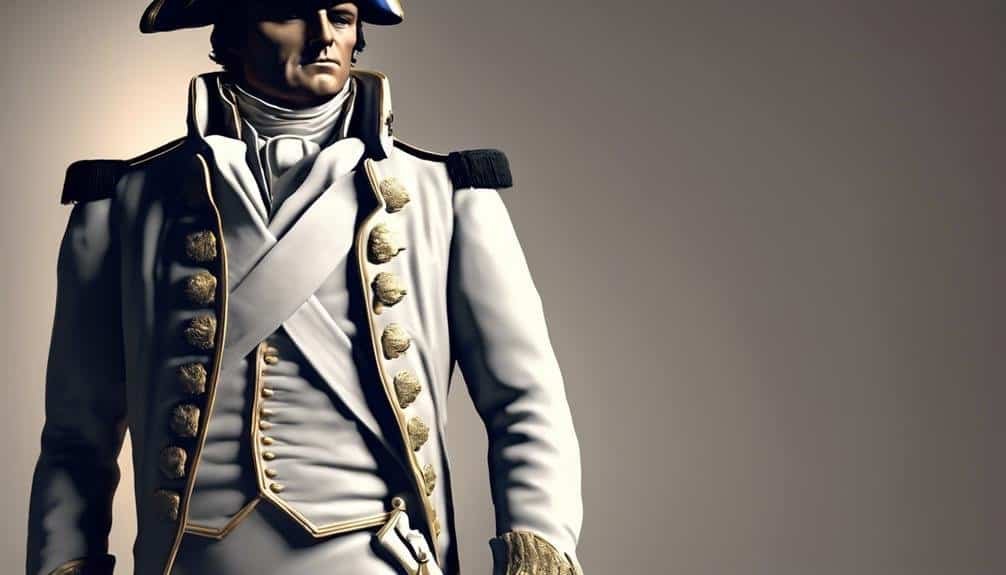Napoleon Bonaparte Personality Type
Napoleon Bonaparte showcased a personality type marked by unmatched ambition, strategic brilliance, charismatic leadership, and a complex mix of determination and authoritarian traits. His impact on European politics and history is profound. To understand more about his early influences, military tactics, leadership style, and psychological intricacies, explore the intricate details of his life and legacy.
Key Takeaways
- Ambitious and determined leader driven by personal greatness and historical impact.
- Charismatic with inspiring vision and effective communication skills.
- Strategic genius with innovative military tactics and attention to detail.
- Authoritarian tendencies and ruthless tactics in pursuit of power.
- Complex psychological profile marked by ambition, charisma, and authoritarianism.
Early Life and Influences
During his early years, Napoleon Bonaparte's upbringing and surroundings greatly shaped his future personality and leadership style. His childhood experiences were marked by the influences of the Corsican culture and the political turmoil of the time, instilling in him a sense of resilience and adaptability. Growing up in a family of modest means, Napoleon's educational background and upbringing were heavily influenced by his enrollment in military school at a young age. This early exposure to military discipline and strategic thinking laid the foundation for his later military successes and leadership style.
Napoleon's formative years were instrumental in shaping his ambitious and determined personality. His experiences taught him the value of hard work and perseverance, traits that would later define his rise to power. Additionally, the political climate of the late 18th century France provided Napoleon with the opportunity to showcase his leadership qualities, further solidifying his reputation as a skilled strategist and visionary leader.
Ambition and Determination
Napoleon Bonaparte's unmatched ambition and unwavering determination propelled him towards unprecedented success in both military conquests and political endeavors. His ambitions were grand, yet his determination to achieve them was even greater. Here's a breakdown of how his ambition and determination shaped his character:
- Ambition vs. Obsession: Napoleon's ambition was strategic and calculated, driving him to expand his empire and leave a lasting legacy. However, at times, this ambition bordered on obsession, leading him to take risks and make decisions that some viewed as reckless.
- Determination and Sacrifice: Napoleon's determination was unwavering; he was willing to sacrifice personal relationships, comfort, and even his own safety to achieve his goals. This steadfast determination allowed him to overcome countless obstacles and setbacks throughout his career.
- Striving for Greatness: Napoleon's ambition and determination weren't solely focused on personal gain but also on leaving behind a mark on history. His relentless pursuit of greatness led him to reshape the political landscape of Europe and establish a prominent position in the annals of military history.
Military Genius and Tactics
Military strategy and tactics played a pivotal role in Napoleon Bonaparte's unprecedented success on the battlefield and his ability to outmaneuver his adversaries. His strategic brilliance and innovative approach to military planning set him apart as a military genius of his time. Napoleon was a master of battlefield tactics, often employing innovative strategies that caught his opponents off guard. His ability to adapt to changing circumstances and think quickly on his feet allowed him to secure victories in numerous battles.
Napoleon's military innovation extended beyond traditional methods, incorporating new technologies and tactics to gain the upper hand. His strategic planning was meticulous, considering various possible scenarios and devising effective countermeasures. This attention to detail and forward-thinking approach contributed significantly to his success on the battlefield.
Charismatic Leadership Style
With a magnetic presence that drew followers to his cause, Napoleon Bonaparte's charismatic leadership style captivated those around him, shaping the course of history. His charismatic influence and leadership techniques were instrumental in rallying troops and inspiring loyalty.
Here are three key aspects of Napoleon's charismatic leadership style:
- Inspiring Vision: Napoleon was skilled at painting a vivid picture of the future he envisioned, instilling a sense of purpose and direction in his followers. His ability to articulate a compelling vision for his campaigns and conquests motivated his troops to achieve seemingly impossible feats.
- Effective Communication: Through charismatic communication, Napoleon could connect with his followers on an emotional level, fostering trust and loyalty. His speeches weren't only persuasive but also resonated with the hopes and aspirations of those who fought under his command.
- Empowering Team Motivation: Napoleon excelled in empowering his team members, delegating authority, and recognizing individual achievements. By fostering a sense of importance and contribution among his officers and soldiers, he cultivated a motivated and cohesive army that was willing to follow him into battle.
Complex Psychological Profile
Examining Napoleon Bonaparte's complex psychological profile reveals a multifaceted individual with intricate motivations and behavioral patterns that shaped his leadership style and decision-making processes. Napoleon's personality traits were marked by a strong sense of ambition, determination, and a strategic mindset. His motivations were driven by a desire for power, glory, and a vision of creating a lasting legacy. These motivations fueled his relentless pursuit of conquest and expansion across Europe.
Napoleon's behavioral patterns exhibited complexities that included a strong sense of self-confidence, charisma, and a commanding presence. He was known for his ability to inspire loyalty among his troops and instill fear in his enemies. However, his authoritarian tendencies and ruthless tactics also showcased a darker side to his leadership style.
Impact on European History
Napoleon Bonaparte's impact on European history can be examined through his military conquests, political reforms, and influence on the continent's power dynamics.
His military campaigns reshaped borders, alliances, and the balance of power among European nations.
Additionally, Napoleon's implementation of legal and administrative reforms left a lasting legacy that influenced the political systems of many European countries.
Military Conquests Influence
The impact of Napoleon Bonaparte's military conquests on European history was profound, reshaping the political landscape of the continent. His exceptional military strategy and strong leadership qualities were instrumental in his success.
Key Points:
- Expansion of French Empire: Napoleon's military conquests greatly expanded the borders of the French Empire, exerting dominance over much of Europe.
- Spread of Nationalism: Through his conquests, Napoleon unintentionally fueled nationalist sentiments in the regions he occupied, ultimately contributing to the rise of independent nation-states.
- Military Innovations: Napoleon's victories highlighted the importance of rapid mobilization, centralized command structure, and strategic use of artillery, influencing military tactics for years to come.
Political Reforms Legacy
With a lasting impact on European history, Napoleon Bonaparte's political reforms legacy reshaped governance structures across the continent. His implementation of political reforms aimed to centralize power, streamline administration, and establish uniform legal systems.
Napoleon's Code Civil, also known as the Napoleonic Code, influenced modern legal systems in many European countries. This code emphasized equality before the law, property rights, and secularism, setting a precedent for legal reform.
Additionally, his reorganization of territories into departments and promotion based on merit rather than noble birth had a significant impact on modern bureaucracies. Napoleon's political reforms left a lasting imprint on European governance and continue to influence political systems to this day.
European Power Dynamics
European power dynamics during Napoleon Bonaparte's era were characterized by shifting alliances, territorial conquests, and strategic rivalries that reshaped the geopolitical landscape of the continent.
Key Points:
- European Alliances: Nations formed and dissolved alliances rapidly in response to Napoleon's ambitions, leading to a volatile political environment.
- Power Struggles: Competing for dominance, major European powers engaged in conflicts that redrew borders and challenged established hierarchies.
- Diplomatic Negotiations: Diplomacy played an important role as states sought to navigate the intricate web of alliances and forge strategic partnerships to counterbalance Napoleon's expanding influence.
Legacy and Historical Interpretations
In evaluating Napoleon Bonaparte's legacy and historical interpretations, one can't overlook the lasting impact he had on the course of European history.
The debate surrounding his legacy often hinges on contrasting views of him as a visionary reformer who modernized institutions and legal systems, versus a power-hungry dictator who brought about immense suffering through his military conquests. Historians continue to analyze his character traits and actions to understand the complexities of his rule.
Napoleon's strategic military prowess, administrative reforms, and the Napoleonic Code are often highlighted as significant contributions to Europe's development. On the other hand, his authoritarian tendencies, costly wars, and suppression of opposition have sparked criticism and debate.
Through various historical interpretations, Napoleon is viewed as a revolutionary figure who disrupted the established order or as a destabilizing force that led to widespread conflict.
Relationship Dynamics and Personal Life
Examining Napoleon Bonaparte's personal relationships and private life reveals intriguing insights into his character beyond his public image and political achievements.
- Romantic relationships: Napoleon's personal life was marked by intense romantic relationships, particularly with Josephine de Beauharnais. Despite their passionate love, their marriage faced challenges due to Napoleon's ambition and Josephine's inability to provide an heir, leading to their eventual divorce. This highlights Napoleon's struggle to balance his personal desires with his political aspirations.
- Social interactions: While Napoleon was a skilled military leader and politician, his interpersonal skills and emotional intelligence were often lacking. His relationships with family members, friends, and even close advisors were characterized by power dynamics and a lack of empathy, showcasing his difficulties in forming deep emotional connections.
- Personal struggles: Behind Napoleon's facade of strength and determination, he grappled with personal insecurities and self-doubt. These inner conflicts often spilled over into his relationships, influencing his behavior and decision-making, ultimately shaping his personal life and legacy.
Psychological Analysis and Speculations
When examining Napoleon Bonaparte's leadership style, it's important to ponder the intricate interplay between his ambition and drive.
By delving into the psychological influences that shaped Napoleon's decisions and actions, a more nuanced understanding of his personality type can be achieved.
These points offer a starting point for a deeper analysis of Napoleon's character and the factors that drove his historical legacy.
Napoleons Leadership Style
Napoleon Bonaparte's leadership style bears the marks of a strategic visionary with a penchant for decisive action. His approach to leadership can be analyzed through the following points:
- Strategic Planning: Napoleon excelled in devising elaborate military strategies that often outwitted his opponents, showcasing his ability to think several steps ahead.
- Authoritative Decision-Making: Known for making swift and authoritative decisions, Napoleon's leadership style reflected a confidence that inspired loyalty and obedience among his troops.
- Adaptability: Despite his strategic vision, Napoleon also demonstrated a willingness to adapt his plans as circumstances changed, showcasing a dynamic approach to leadership that could evolve based on the situation at hand.
Napoleons Ambition and Drive
Amidst the complexities of Napoleon Bonaparte's character, his relentless pursuit of power and success stands out as a defining trait that shapes his ambitions and propels his actions.
Napoleon possessed an ambitious drive that was fueled by his desire to conquer and expand his empire. His determination to achieve his goals made him a formidable and determined leader. This ambitious nature led him to take risks and push the boundaries of conventional warfare and governance.
Napoleon's unwavering focus on his ambitions enabled him to rise to great heights of power and influence, leaving a lasting impact on history. His drive to succeed was a driving force behind his actions, shaping his legacy as a visionary leader who reshaped the political landscape of Europe.
Napoleons Psychological Influences
In examining Napoleon Bonaparte's psychological influences, one discerns a complex interplay of factors that shaped his decisions and behaviors.
- Psychological Influences: Napoleon's upbringing in Corsica instilled in him a strong sense of nationalism and ambition.
- Personality Traits: His authoritarian personality and need for control influenced his leadership style and decision-making processes.
- External Factors: The volatile political climate of post-revolution France and the desire to prove himself as a military genius also played a significant role in shaping Napoleon's psychological makeup.
These psychological influences and personality traits combined to create a complex individual driven by a mix of personal ambition, strategic thinking, and a desire for power and recognition.
Conclusion
To sum up, Napoleon Bonaparte, often lauded as a military genius and charismatic leader, had a complex personality that left a lasting impact on European history. His ambition and determination propelled him to great heights, but his downfall was equally dramatic.
Despite his historical significance, his legacy is a reminder of the thin line between greatness and downfall in the annals of history. Napoleon's rise and fall serve as a cautionary tale for leaders throughout the ages.








